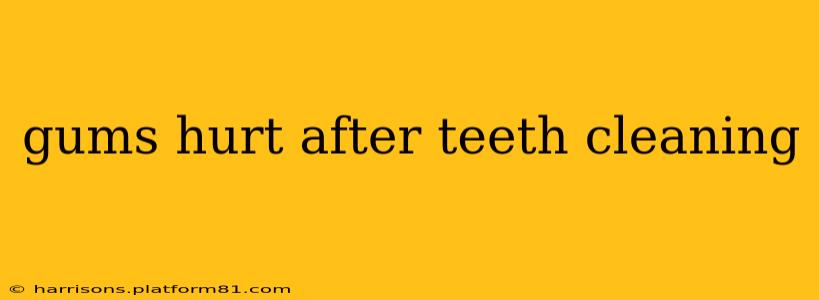Going to the dentist for a teeth cleaning is crucial for maintaining good oral hygiene. However, many people experience some level of gum soreness afterward. This is often temporary, but understanding the causes and how to manage the discomfort can make a big difference in your post-cleaning experience. This article will explore the reasons why your gums might hurt after a teeth cleaning, provide effective remedies, and offer preventative measures to minimize future discomfort.
Why Do My Gums Hurt After a Teeth Cleaning?
The most common reason for gum soreness after a cleaning is the removal of plaque and tartar. These deposits irritate the gums, and the process of scraping them away can cause temporary inflammation and sensitivity. The cleaning instruments themselves, while designed for gentle use, can also cause some minor trauma to the gum tissue.
The intensity of the pain depends on several factors including:
- Pre-existing gum disease: Individuals with gingivitis or periodontitis (gum disease) tend to experience more significant discomfort because their gums are already inflamed and sensitive.
- Aggressiveness of the cleaning: While rare with a qualified hygienist, a more vigorous cleaning can result in greater irritation.
- Individual sensitivity: Some individuals simply have more sensitive gums than others.
What Can I Do If My Gums Hurt After a Teeth Cleaning?
Fortunately, there are several things you can do to alleviate gum soreness:
- Rinse with saltwater: A warm saltwater rinse (1/2 teaspoon of salt in 8 ounces of warm water) can help soothe irritated gums and reduce inflammation. Rinse gently several times a day.
- Over-the-counter pain relievers: Ibuprofen or acetaminophen can help reduce pain and inflammation. Always follow the recommended dosage on the packaging.
- Use a soft-bristled toothbrush: Avoid harsh brushing, which can further irritate sensitive gums. Opt for a soft-bristled toothbrush and brush gently.
- Cold compresses: Applying a cold compress to your cheek can help numb the area and reduce swelling.
- Avoid irritating foods: Steer clear of acidic, spicy, or hot foods that may further irritate your gums. Stick to soft, bland foods for the first day or two.
How Long Does Gum Soreness Last After a Cleaning?
The duration of gum soreness varies from person to person. For most people, the discomfort subsides within one to three days. If the pain persists for longer than a week, or if it's severe, it's essential to contact your dentist. This could indicate a more serious underlying issue.
Is it Normal for Gums to Bleed After a Cleaning?
Some bleeding is often normal after a professional cleaning, especially if you have gum disease. However, excessive or prolonged bleeding is not normal and warrants a call to your dentist.
How Can I Prevent Gum Soreness After My Next Cleaning?
- Maintain good oral hygiene: Consistent brushing and flossing at home significantly reduce plaque buildup, minimizing the need for aggressive cleaning during your appointment.
- Regular dental checkups: Regular checkups and cleanings help prevent the accumulation of plaque and tartar, reducing the likelihood of gum irritation.
- Inform your dentist about sensitivities: If you have particularly sensitive gums, let your dentist know beforehand. They can adjust their techniques to minimize discomfort.
Should I Worry If My Gums Are Still Sore After a Few Days?
While mild soreness is expected, persistent or worsening pain after a few days could signal a problem. Contact your dentist to discuss your concerns. They can assess your gums and determine if there's an underlying issue requiring attention.
By understanding the causes and remedies for post-cleaning gum soreness, you can better manage any discomfort and maintain a healthy smile. Remember, regular dental checkups are crucial for preventative care and overall oral health.
